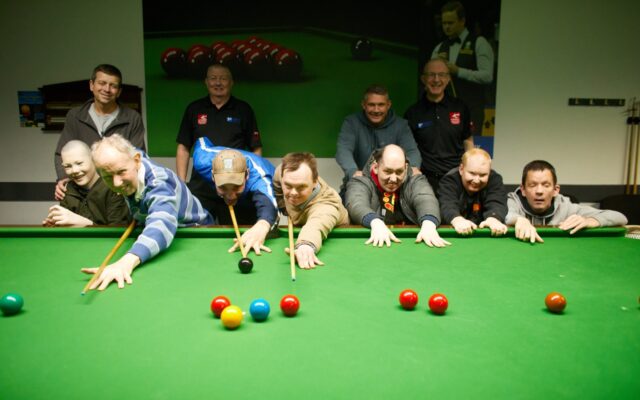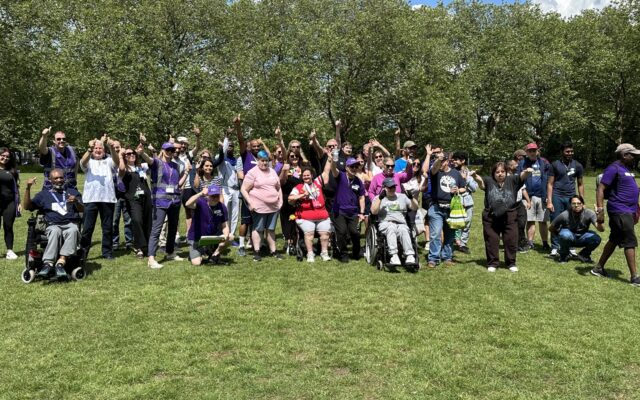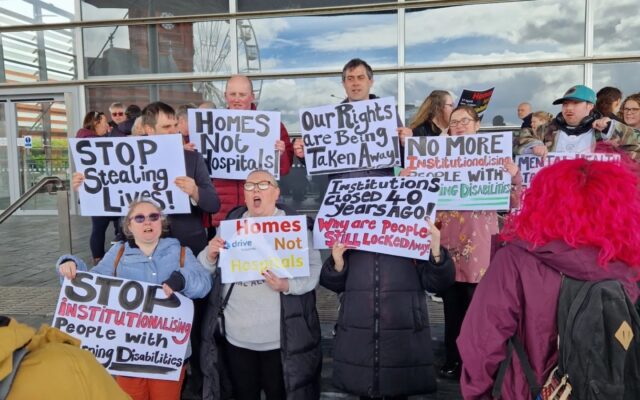People with learning disabilities are often deprived of the right to a sexual life, says Sue Sharples who runs courses in personal relationships and sexuality involving people as programme designers and co-presenters.
Becky, a self-advocate from Lancashire, describes the impact of her attendance on a recent sexuality and relationships training course as enabling her to take a ’big leap’ into a world of potentially pleasurable, rewarding intimate relationships. It was a world previously closed to her by intense fear, misconceptions and other people’s negative attitudes.
A small group of people with learning disability, including Becky, providers and commissioners, have been meeting for several months to discuss how services in Lancashire can be more responsive and sensitive to the sexuality and relationships needs of her peers.
As a representative of the Brothers of Charity, Voice for All Advocacy group, based in Chorley she has been instrumental in the development of a guide for staff entitled, ‘How best to support me with Friendship and Relationships’.(1) Yet, Becky has become increasingly frustrated by the lack of access to good information, advice and education about sexuality and sexual health.
Sparse commitment
The group shared difficult and, sadly, not uncommon stories of enforced sterilisation, sexual assault, impersonal provision of facts by way of explicit and alarming line drawings, alongside numerous examples of supporters unable or unwilling to answer queries of a sexual nature. They noted, that following local investment in staff sex and relationships training in the 1980s and 1990s, there had been sparse commitment to developing further skills in this area. In fact, other issues, including a focus on safeguarding and mental capacity, leading to the prioritisation of risk over rights had created a general reluctance amongst paid supporters to tackle what was seen as a ‘can of worms’. This reflects the picture described in the study ‘Talking about sex and relationships, 2010’ (2) describing young adults generally receiving inadequate education, resulting in confusion and distress about relationships and sex.
Driven steadfastly by self-advocates’ determination to ensure their right to a sexual life was upheld, the Lancashire Group started work on a strategy that would identify existing relevant services, analyse the gaps, engage relevant partners and raise awareness. A supportive approach was taken to provider involvement, holding a workshop that gave them relevant resources, such as a template to assist a review of agencies’ ‘Personal Relationships and Sexuality’ policies. The area that providers identified as requiring most attention was, however, training for staff and the people they support.
As a new and enthusiastic graduate of the FPA’s specialist learning disability and sexuality courses (3) I was keen to work with the group to develop training that met their specific requirements locally. It was Becky who was one of the main protagonists in getting this off the ground, encouraging us to take an action-focussed, collaborative approach, that would be accessible and enjoyable.
The resultant training programme, ‘Y be shy about sex and relationships’, had the major aim of assisting people to feel more comfortable about discussing sexual health, thereby overcoming some of the identified deterrents to learning and development. A key factor was to be fully inclusive, with people who have a learning disability being programme designers and co-presenters, following a training and induction period. Being mindful of the recommendation that ‘People with an intellectual disability have a rightful and essential place at the table as partners in planning and running sexuality and relationships programmes’(4). Equally, each course has involved paid and unpaid supporters, working alongside adults who use services.
Broke down barriers
John, a member of staff involved in the Brothers of Charity course, believes that there were significant benefits in learning together. “It broke down barriers,” he said. “We were walking a hard road together and realising that we all had the same needs and vulnerabilities. Staff realised they had a lot to learn and without proper knowledge they could not provide adequate support”. Stephen, one of the co-trainers, identified that people had developed a relationship of trust that offered wider opportunities for continued support and discussion outside the training room.
The six-week programme explores values and attitudes, different types of relationships, dating, understanding sexual and sensual needs, awareness of how our bodies work, including maintaining sexual health, appropriate/inappropriate behaviours, public/private places, staying safe, the legal framework and accessing advice and information. Flexibility has been a significant requirement, as each group has identified particular areas of interest or concern. In one session, extended discussion about same gender relationships led to a couple being open about their feelings for each other and with the help of additional information, staff being confident about supporting the relationship to flourish. Throughout, participants have said the delivery in a fun, relaxed and interactive environment is a key factor in reducing anxiety about the subject matter and encouraging personal development.
Humane option
The group is now campaigning for the training to be rolled out across the county, working in partnership with universal sexual health services. At a time when direct support resources are constrained and there is increasing emphasis on wellbeing and self -sufficiency, this is one way in which vulnerability to abuse can be reduced, physical and mental health maintained and mutual support encouraged in a cost effective manner. Vivien Cooper of the Challenging Behaviour Foundation has said that access to good information and advice can limit sexualised behaviours which may be considered challenging (5). A preventative approach, rather than reacting when things have gone wrong, including individuals coming to the attention of safeguarding or forensic services is surely a cheaper and more humane option.
There is still a recognised challenge to embed thinking about opportunities for sexual expression and intimate relationships into the design and delivery of support, despite the advances that have been made in social and health care planning. A manager who attended one of the training programmes, described it as the start of a wider systems change for his organisation which would test their capacity to truly respond to people’s aspirations and entail changes at policy, practice and strategic level.
Having recently attended the excellent national Luv2meetU conference in Bradford (Luv n Friends Matter 2 Us All, 14 July, 2015, organised by Hft) which focussed on dating, sexual health, friendship and inclusion, it seems clear that across the country, there is patchy access to training, information and advice for people with learning disabilities. However, a shared enthusiasm for addressing what can sometimes seem like the ‘last taboo’, was very apparent amongst the gathering. This gives hope that we are regaining some of the ground laid by Ann Craft and others in the 1980s, echoed in her suggestion that, “Policy guidelines, training and support are all required to enable staff to act positively, constructively and responsibly in response to the individual sexual needs of people with learning disabilities.” (6) Perhaps there needs to be a similar national steer and the banding together of individual and organisational champions, to ensure there is comprehensive access to the opportunities, in Lancashire and elsewhere, that helped Becky take the ‘big leap’, to a place where choice, opportunity and confidence in developing relationships prevail.
References
1.Voice for all, (2014) How best to support me with friendships and relationships, Brothers of Charity, Chorley, Lancashire.
- Barnes, C and Garbutt, R (2010) Talking about sex and relationships: the views of young people with learning disabilities. University of Leeds, Centre for Disability Studies
3.FPA training courses. Liberating life choices: promoting the positive sexuality of people with learning disabilities; and Delivering sex and relationships work with people with learning disabilities: practical approaches.
- Chapman, R., Ledger, S., Townson, L. Ed (2015) Sexuality and relationships in the lives of people with intellectual disabilities. London, Philadelphia. Jessica Kingsley
5.Salman,S (2012) What sex education is available for people with a learning disability? The Guardian article, 7 June 2015.
6.Craft, A (1994) Practice issues in sexuality and learning disability
New York, London. Routledge.
Sue Sharples is Director of Y Training, U-Night Group and VOXCIC. For futher information she can be contacted on sue@ytraining.co.uk or 07834695606




